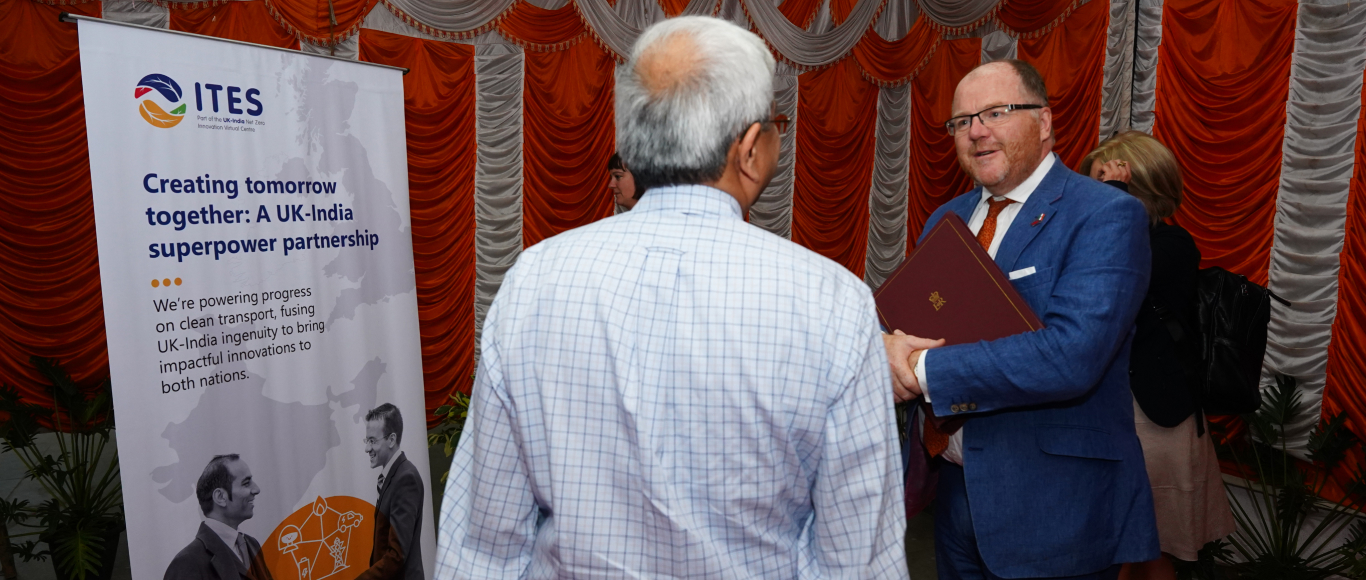Comment by Andrew Stokes, Senior Advisor – Innovation Support and International at Energy Systems Catapult.
As temperatures soared across Europe, North America, and Asia, sending the mercury to record levels, the UK’s Science Minister, George Freeman MP, attended the G20 in India to promote the power of collaboration in tackling the climate crisis, among other global challenges. I had the pleasure of meeting the Minister in Bengaluru as he visited Energy Systems Catapult’s Innovating for Transport and Energy Systems (ITES) initiative – the flagship UK-India partnership driving transport decarbonisation.
As the UK’s leading proponent of a whole systems approach to Net Zero, we have seen time and time again how bringing together stakeholders helps design, develop, and deliver solutions faster. The complexity of Net Zero means we simply can’t find answers in isolation. We’ve made it our mission to drive progress by reaching across the whole energy ecosystem – connecting innovative UK businesses with consumers and industry and supporting successful action through the multiple insights and engagement of economic sectors, government departments, and world-leading researchers.
Launched in May 2023, ITES is a vital initiative that embodies our belief that the quickest path to Net Zero is one of collaboration. ITES is backed by the British and Indian governments, Innovate UK, and is led by Energy Systems Catapult in the UK and our friends at the renowned Indian Institute for Science. ITES was one of the first bilateral partnerships spurred by a landmark Memorandum of Understanding (MoU) between the UK and India. Aiming to boost science and technology between the two countries, the agreement is supporting an innovation exchange that will help the UK and India leverage a mutually rich reputation for cutting-edge thinking and clean tech to tackle the toughest Net Zero challenges.
George Freeman MP at the G20 in India
“The world urgently needs to harness science and technology to better tackle the urgent global challenges faced by our planet. The urgency of these challenges and the pace and intensity of the global race for Science and Technology make science diplomacy more important than ever.”

And when talking about Net Zero challenges and opportunities for innovation, you don’t get much tougher than transport. Responsible for over 20% of global greenhouse gas emissions, it is second only to the power sector for its devastating impact on air quality and climate change. Unlocking action on clean transport is a vital piece of the Net Zero puzzle, making sure we find least-cost, real-world solutions that work for industry, governments, and consumers.
It’s a priority shared by the UK Science Minister George Freeman, who visited ITES HQ in Bengaluru during his trip to India for the G20 this month. The Minister heard from innovators and our academic partners how ITES will help UK startups take their ideas to market, and connect industry and leaders with the innovation, information and data they need to turn ambition into Net Zero action.
The Minister visited ITES alongside other high-impact UK-India initiatives. These included the Serum Institute of India (SII), whose unprecedented pace of collaborative work with Oxford University and AstraZeneca delivered the lifesaving COVID-19 vaccine.
Not unlike the SII’s partnership with those heavyweights of UK science and research, ITES brings together the best of UK and Indian science and tech expertise to unlock innovation at unprecedented pace, where being slow to act risks loss of life. The real-life crises presented by climate change is thrown into sharp relief in India – a global financial powerhouse, home to deep digital expertise, world-class universities and research institutions – poised to be adversely affected by climate change and carbon emissions. In 2020, a report by The Lancet revealed that 67 million deaths in India were attributed to air pollution in 2019 (almost 20% of all deaths in the country), with India expected to be among the first to experience severe health and economic crises as a result of extreme weather conditions caused by climate change.
Alex Ellis, British High Commissioner
“The science, research, and technology partnership between the UK and India makes our two countries and the world better. Through the 2030 UK/India Roadmap, and multilateral fora like the G20, our countries are improving health, well-being and prosperity for all.”

By bringing together UK innovation with Indian partners and investors across industry, academia and government, ITES will not just turbocharge sustainable industries, but also a clean transport transition in the UK, India and beyond that means a positive future for people and planet.
ITES is currently focusing on installation and testing of charge point technologies, flexibility solutions such as smart charging and V2G, e-mobility solutions, software for optimisation of transport energy, energy storage/generation solutions linked to transport, testing of new business models and types of consumer engagement, installation and testing of clean energy supply for EV charging, system solutions for fleet decarbonisation, the role of hydrogen in decarbonising the transport sector and complete system modeling to assess transport decarbonisation pathways.
As Minister Freeman himself put it last week: “The urgency of these challenges and the pace and intensity of the global race for Science and Technology make science diplomacy more important than ever.
“Science and diplomacy move slowly, right? No more.”
At ITES we’re proud to be building scientific bridges to redefine how we design, develop and deliver our global Net Zero future.
Stay updated
Be first to hear about SME support, UK – India innovation, cutting edge pilots, insights and more.
loerm ipsum is simply dummy text of the printing



